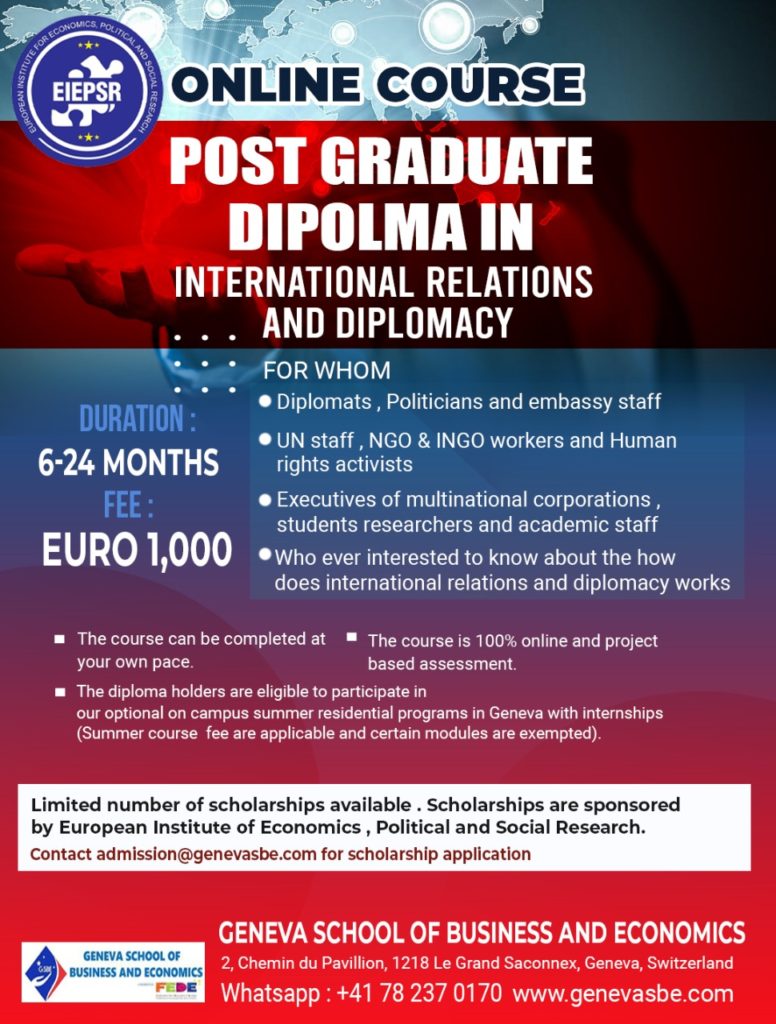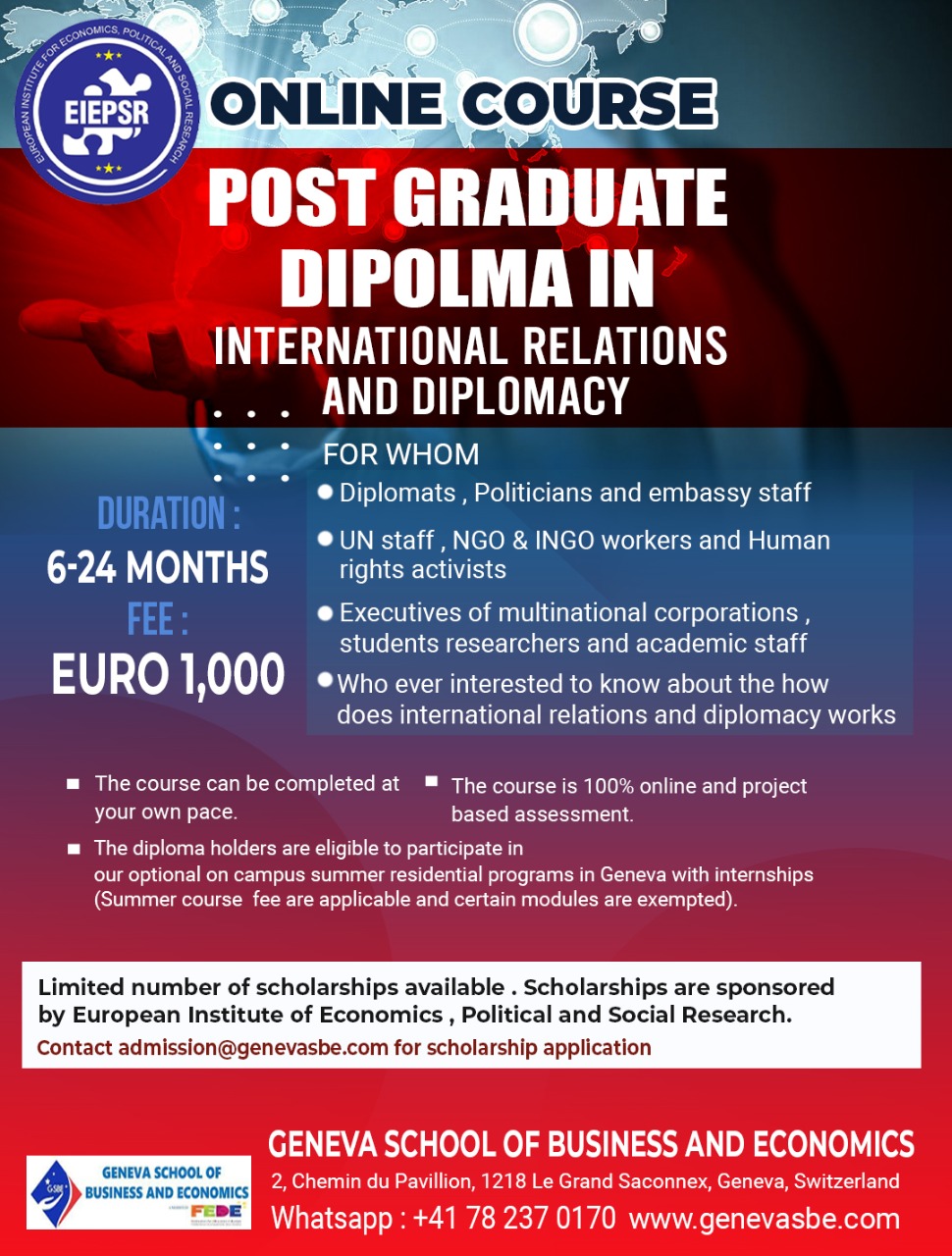POSTGRADUATE DIPLOMA IN INTERNATIONAL RELATIONS AND DIPLOMACY

Post Diploma in International Relations and Diplomacy course seeks to provide an opportunity for students who wish to specialize in the area of international relations and diplomacy. The Postgraduate Diploma is structured to meet the needs of individuals who are practically engaged in assignments or duties that demand deeper understanding of the dynamics of International diplomatic relations. While providing students with a theoretical understanding of international relations, the course will also be enriched by the participation of people from diverse backgrounds who have hands-on experience as well as those involved in humanitarian work. This Swiss Diploma in International Relations and Diplomacy also provides opportunity for Graduate students who desire to improve their skills in international relations.
Curriculum
Geneva is an international city home to 250 NGOs and international organizations such as UN, WHO, Red Cross, WTO, WMO and many more. GSBE has designed this diploma for students gain good working knowledge in International Diplomacy.
This course contains the following modules :
Basics of international relations, Theory of international relations, War, Peace, and history of international relations, Diplomacy, Foreign Policy and project.
Number of partial scholarships are available for qualified students. Send your CV to admission@genevasbe.com
Duration of Study
The Postgraduate Diploma program in International Relations and Diplomacy consists of coursework and examination and shall normally take 3- 6 months.
Click here for Course Details and syllabus for GSBE IR
Program Postgraduate Diploma in International Diplomacy and Relations Study mode Online and summer courses Program length Students need to cover 150 hours study excluding home study.
3 - 6 Months Online.
2 Week Summer course. Admission requirements Good knowledge of English, certificate or diploma in social sciences, law, international diplomacy or basic degree.
Fees Online - CHF 1'000 and
Summer - CHF 1'500
Financial aid Financial aid is available through our partner organization. 60% - 100% financial for tuition fee. Please contact admission office with your cv : admission@genevasbe.com Program intake Online - Through out the year
Summer - July and August
Award Post Graduate Diploma in International Diplomacy and Relations
Accreditation of Prior Learning (APL)
This is a process by which the GSBE gives credit for learning achieved by an individual before entry to a program of study:
- Previously assessed and certificated – this learning may have been previously assessed and certificated by an education provider, in which case it is known as ‘prior certificated learning’
- Acquired outside formal systems – it may also have been acquired outside formal education and training systems (for example, through work experience) and is therefore known as ‘prior experiential learning’
- Claiming for APL – if you feel that you have sufficient qualifications and/or experience to give you partial of full exemption from a programme of study at GSBE you are welcome to make a claim for APL: please note, however, that you must first make a separate application for admission using the accreditation of prior learning form which can be found in the related links on this page.
- Once you send APL to our school, we will inform you the modules that you entitled to claim from our course and fee will be decided case by case based on total approval.
- Please make your application and we will inform you the results within a week.
Click here for application : Accreditation Prior Learning Mapping PGDIP IN IR
Detail Syllabus of Post Graduate Diploma in International Relations and Diplomacy
IR 201.Basics of International Relations – PG Diploma in International Relations and Diplomacy
This course is designed to give basic knowledge in the concept of international relations to the students at post graduate level. It will focus on the development of International relations as a separate discipline of study, the origin of the modern international system, concept of power in international relation and globalization
Objectives:
-
To make the students understand the concept, nature, scope and evolution of international relations.
-
To make them understand the origin and development of state and its role in international relations;
Course contents
- The nature of international relations
- Anarchy and the origin of the modern international system
- Realism
- Liberalism
- Challenging Anarchy : Building world politics
- Criticizing world politics :
- Reconfiguring world politics : Globalization
- Contemporary challenges in international relations
IR 202.Theory of International Relations – Diploma in International Relations and Diplomacy
Course Description:
This course is designed to give an in-depth knowledge in theory and concept of international relations to the students at postgraduate level. It will focus on the development of International relations as a separate discipline of study, the state’s role in the international system, the concept of power in international relation, balance of power system, global governance and the national interest of the states that guides the states in their activities in the international system. The course helps the students in understanding inter-state relations through various perspectives.
Objectives:
– To make the students understand the concept, nature, scope and evolution of international relations and its relation with other social sciences;
– To make them understand the origin and development of state and its role in international relations;
– To acquaint them with the concept of power and the need of balance of power in international system; and
– To provide them the knowledge of national interest and its importance in international relations.
Course contents
- The development of international theory in the 20th century
- International relations theory today
- The state and foreign policy today
- Power and security
- The balance of power and war
- Global governance
- The global economy
- The international politics of identity
- Human rights law, humanitarian law and humanitarian war
IR 203. War, Peace and History of International Relations – Diploma in International Relations and Diplomacy
Course Description:
The course is designed to introduce the postgraduate level, students to the history of international relations from the early period to the end of Cold War. More focus is given from the time when the modern nation state system began in Europe. World War I and World War II and the new world order created by those wars are significant in shaping yet another world order that lasted throughout the 20th century. This course also emphasizes the Cold War and its aftermath.
Objectives:
-
To make the students understand the historical development of international relations from the early period;
-
To give them the knowledge of the causes and consequences of World War I and World War II;
-
To make them understand the division of the world during the Cold War; and
-
To acquaint them with the pre and post Cold War politics of international system.
Course contents
- Carl von Clausewitz and theory of war
- Nineteenth century
- World war I and II
- The mechanization of war
- The cold war I and II
- War and peace after the cold war
- Irregular warfare
- War peace and international order
IR 204. Diplomacy – Diploma in International Relations and Diplomacy
Course Description:
The subject aims at giving students knowledge of the evolution, characteristics and principles of current diplomacy, of existing Foreign Service system and diplomatic activities, its functioning and practicing basic skills necessary for working in the Foreign Service. In addition, supplementary aim of the course is to introduce various aspects of diplomatic practice and mainly to support development of skills of a contemporary diplomat and to provide the knowledge about various types of diplomatic practices as well as the privileges and immunities the diplomats get through the International law.
Objectives:
-
To acquaint the students with the concept of diplomacy and its scope;
-
To acquaint them with the development of diplomatic practices in different phases of history;
-
To make them understand various types of diplomacy that are in practice in the contemporary world; and
-
To make them understand the functions of a diplomat.
Course contents
- The study of Diplomacy
- Analytical framework
- Instiutionalization and Ritualization
- Communication
- Diplomatic representation
- The reproduction of international society
IR 205. Foreign Policy – Diploma in International Relations and Diplomacy
Course Description:
Foreign Policy is a basic tool of conducting international relations. This course is designed to give an in-depth knowledge to the students of bachelor level about the foreign policy of a state in order to understand how they manage to pursue their national goals in the international system. The course will discuss the concept, types, foreign policy making process and how the states adjust themselves in the ever changing international order.
Objectives:
-
To acquaint the students with the concept, objectives and determinants of foreign policy;
-
To make them understand the types of existing foreign policy in the world;
-
To give them the idea how the foreign policies are formulated; and
-
To acquaint them with the changing nature of international order and the role of foreign policy to pursue their national goals in the international system.
Course contents
- Study of foreign policy
- Foreign policy and leadership
- Leaders in context
- Who and what determines foreign policy
IR 206. Mini Thesis Writing – Diploma in International Relations and Diplomacy
Mini thesis is the last project should be written on important themes in international relations or national issues related to the topics that you have studied in the previous modules.
Choose a contemporary topic and write an analytical thesis using several of the major themes presented during the course. Your thesis should be divided into several sections according to the methodology that you have done during the course.
The thesis should be at least 3000 words count.

